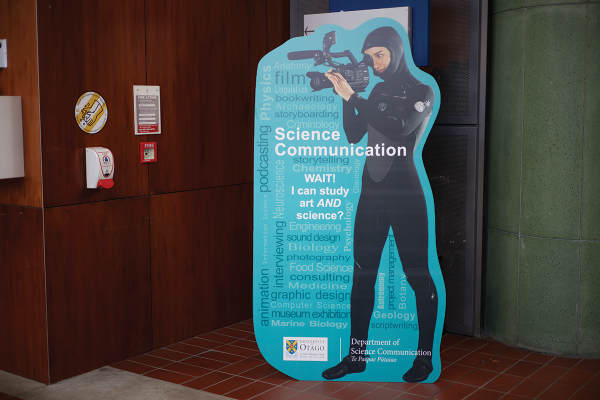Disclaimer: The author of this article is a postgraduate science communication student.
Unless you’ve been living under a rock for the past couple months, you’ll be well aware of the financial shitshow ($60 million deficit) that has forced Otago Uni to make some serious money-saving decisions. The Uni is hoping to make $12.8 million in savings through staff redundancies, and news of what courses are on the chopping block have slowly been leaking through the cracks.
At the end of last semester, on June 7, students in the Department of Science Communication were sent an email from the department head informing them that the department would be among those crippled by the impending cuts. The undergraduate Minor and Master’s programs would “likely” be cut, with the mere two remaining full-time staff being left to run a distance-only post grad certificate and diploma.
Sci Com courses are notoriously small, and the camera gear and field trips can’t be cheap to run, potentially making the department an attractive target for a university trying to save a few bucks. The original email to students reflected this, but cited the small size of the department and their relatively slow growth rate as some of the many reasons they’ve been targeted. None of the details of the email were able to be confirmed by the University, who told us it was “sent prematurely”.
Needless to say, students and recent graduates of the programme were gutted by news that signalled “the end of an era” of a course that is unique not only nationwide, but around the globe. “Otago’s department is the envy of an entire discipline,” said recent science communication graduate Asia. “No other science communication degree is like ours, which teaches everything from filmmaking to journalism to animation.”
The sentiment was echoed by international students Brady and Stephanie who both waited years to come here through the pandemic. “There was something about the program here at the University of Otago that was so unique and impactful that I was happy to wait two, three, four, even five years if I needed to just because of the professors and the program that is offered here,” said Brady.
Asia was baffled at the rationale behind the proposal to gut the department, not only because of its worldwide status, but because “we need [science communication] more than ever… A life without science communication looks like this: no museums, no films, no podcasts, no National Geographic, no communication about the worldwide pandemic outbreak for which Aotearoa is famous.” To put it bluntly, she said, “The University of Otago might as well round up Daddy Bloomfield, David Attenborough, Suzy Cato, and shoot them in the head.”
Pro-Vice-Chancellor (Sciences) Richard Barker reassured students that all students currently enrolled will be able to complete their degrees. But the quality of those degrees is up for debate as the email to students indicated that there would be a “shortfall in supervision” for Masters students given the reduction in staffing. Brady said that he had “doubts about that if they’re cutting the whole department and we only have two advisors for 30-40 students.”
Students hoping to upgrade from a diploma to a Masters like Steph, who had been working on her application all semester, were also told that the pathway may no longer be open to them if the proposed changes were to go ahead. “I literally sent off my Masters application one minute before that email was sent. And if I knew that they weren’t even looking to accept anybody I wouldn't have wasted all of that time.”
When asked if she thought the Uni recognised the value of the program, Steph simply responded: “I don’t think that people are seeing value the right way if they can’t see the kind of people that are coming out of this program and the impact that they’re having in the world.” Pro-Vice-Chancellor Richard Barker responded that the Division of Science and the Uni believe that “the communication of science is a vital component in today’s world and the University intends to continue offering an academic programme in this subject.” What this programme will look like, however, remains uncertain.
Brady, Steph and their classmates sent out a press release to media outlets along with a video calling for the Uni to include them in the conversation about cuts made. “It feels like we’re talking to a wall at this point,” said Steph. The Uni told Critic Te Ārohi that it is a “high priority” that they communicate with staff and students to keep them updated on any proposed changes, expecting “to be able to share details with students and staff later this month for their feedback.”
We will continue to cover the story of this department and others at the University of Otago as the funding saga unfolds






